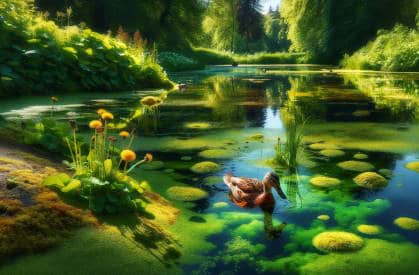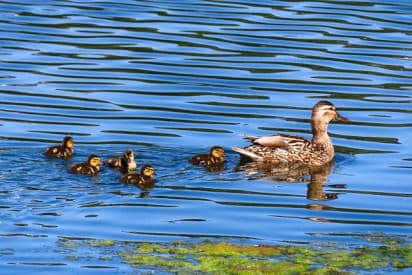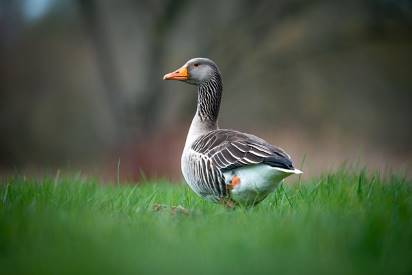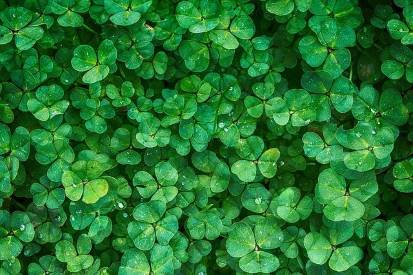As a devoted duck keeper, I often ponder their diet and well-being, and a question that regularly surfaces is: can ducks eat algae? The answer is yes; ducks can indeed include algae in their diet, and it’s quite a nutritious snack for them. This simple, green plant found in their natural habitat is not just safe but also beneficial, given its rich nutrient profile.
However, like any aspect of raising ducks, feeding them algae comes with its nuances. It’s about knowing the types, understanding the benefits, and being aware of the potential risks. As we wade through the details, let’s dive into what makes algae a good fit for our feathered friends and how to manage it in their diet.

Overview of Algae as a Food Source
Algae isn’t just that green stuff that clings to rocks and gives ponds a murky look – it’s a food source, too. But when discussing ducks munching on algae, what exactly are we picturing?
Types of Algae Commonly Found in Duck Habitats
In the wild, ducks come across an array of algae, both in freshwater and saltwater environments. Freshwater ponds might be home to green algae and diatoms, while saltwater habitats serve up sea lettuce and red algae. Each type has its own flavor and appeal to our feathered friends.
Basic Nutritional Content of Algae
Algae might seem humble, but it’s pretty mighty when it comes to nutrients. It packs a punch with essential macronutrients – think proteins and carbs – and vitamins and minerals. For ducks, it’s like stumbling upon a natural multivitamin.
[DuckAffiliate]
Ducks’ Dietary Habits
Ducks aren’t picky eaters. They’re happy foragers, skimming ponds and pecking at the ground for a bite.
Natural Diet of Wild Ducks
Wild ducks have a buffet-style approach to feeding, snacking on everything from seeds to small fish. Depending on the season, they’ll switch up their menu, but they’re always looking for a tasty algae treat.
The Role of Algae in a Duck’s Diet
While algae might not be the main course, it’s often part of the mix. It’s like the side salad to their main dish—it rounds out their diet with a splash of variety and an extra nutritional kick.
Benefits of Algae for Ducks

Turns out, algae is more than just duck food – it’s got some serious perks.
Digestive Health
Algae’s fiber content makes it the unsung hero of the duck’s digestive system, keeping things moving and grooving. Plus, some types of algae might even act like a probiotic, helping maintain a healthy gut flora.
Energy and Growth
With its high-quality protein, algae supports ducks from the inside out, fueling their energy needs and keeping their feathers glossy and bones sturdy. It’s the unsung hero of their growth and development.
Potential Risks of Algae Consumption

But it’s not all smooth sailing. There are a couple of red flags regarding ducks and algae.
Toxic Algae Blooms
Now and then, algae can turn villainous, with blooms that produce toxins harmful to ducks. It’s crucial to know which algae is a friend and which is a foe to keep our duck buddies safe.
Algae as a Sole Dietary Component
Algae alone won’t cut it. Ducks need variety to thrive, and relying solely on algae could leave them missing vital nutrients.
Feeding Algae to Domestic Ducks

Are you thinking of adding a sprinkle of algae to your domestic ducks’ diet? Here’s the lowdown.
Safe Practices for Introducing Algae
Start slow and keep an eye out. Introducing algae to your ducks’ diet should be a gradual affair, and you’ll want to watch for any signs of tummy trouble or winged bliss.
Sourcing and Preparing Algae
Not all algae are created equal. Ensuring you’re giving your ducks the good stuff means finding reputable sources and prepping it right – clean, fresh, and ready to gobble.
Enhancing Pond Ecosystems for Ducks
Creating a duck-friendly pond means getting the algae balance just right.
Balancing Algae Growth in Duck Habitats
Too much algae can spoil the pond party. Natural controls and a little pond-keeping know-how can keep the green growth in check.
Plants and Algae: Creating a Healthy Pond
A well-planned pond has room for both plants and algae. The right greenery can complement algae, creating a lush, healthy habitat where ducks can dive and dine to their hearts’ content.
What other plants can ducks eat apart from algae?

Ducks are natural foragers, often seen dabbling around for a tasty bite. While algae is a well-known staple in their diet, there’s a variety of other plants that can offer them both nutrition and variety. Let’s take a closer look at three such plants that are not only safe but also beneficial for our quacking companions.
Duckweed
Often mistaken as algae due to its dense and mat-like presence on water bodies, duckweed is a tiny aquatic plant. It’s a duck’s delight, rich in protein and essential nutrients, making it an excellent supplement to their regular diet.
Duckweed grows rapidly and can often be found in the same ponds where ducks paddle, making it a convenient snack. Feeding on duckweed can help ducks meet their nutritional needs, especially during the molting season when they require extra protein to regrow feathers.
Read More: Can Ducks Eat Duckweed? Nourish Your Flock
Dandelions
Dandelions are much more than just garden weeds; they’re a powerhouse of nutrition. These bright yellow flowers, along with their leaves, are packed with vitamins and minerals beneficial for ducks.
Dandelions can aid digestion and help liver function due to their detoxifying properties. Ducks can safely nibble on these plants, and they often do, plucking them right out of the ground with gusto.
Read More: Can Ducks Eat Dandelions? 5 Excellent Benefits
Clover
Clover, with its trio of leaflets, is not just lucky for humans but for ducks as well. This plant is an excellent source of proteins, vitamins, and minerals. It’s particularly high in calcium, which is essential for laying ducks to produce strong eggshells.
Plus, clover is a legume, which means it’s beneficial for the soil too, fixing nitrogen and improving the quality of the land it grows on. Ducks will often graze on clover much like they would on grass, and it’s a healthy addition to their diverse diet.
Read More: Can Ducks Eat Clover? 5 Interesting Benefits
Can ducks eat algae – final thoughts
Algae isn’t just pond decor; it’s a nutritional jackpot for ducks, offering a spread of proteins and fibers vital for their well-being. So, can ducks eat algae? Yes, they can – and they should, with a watchful eye on quality and quantity. It’s a green feast that, when served responsibly, keeps our ducks healthy, happy, and quacking with joy.
